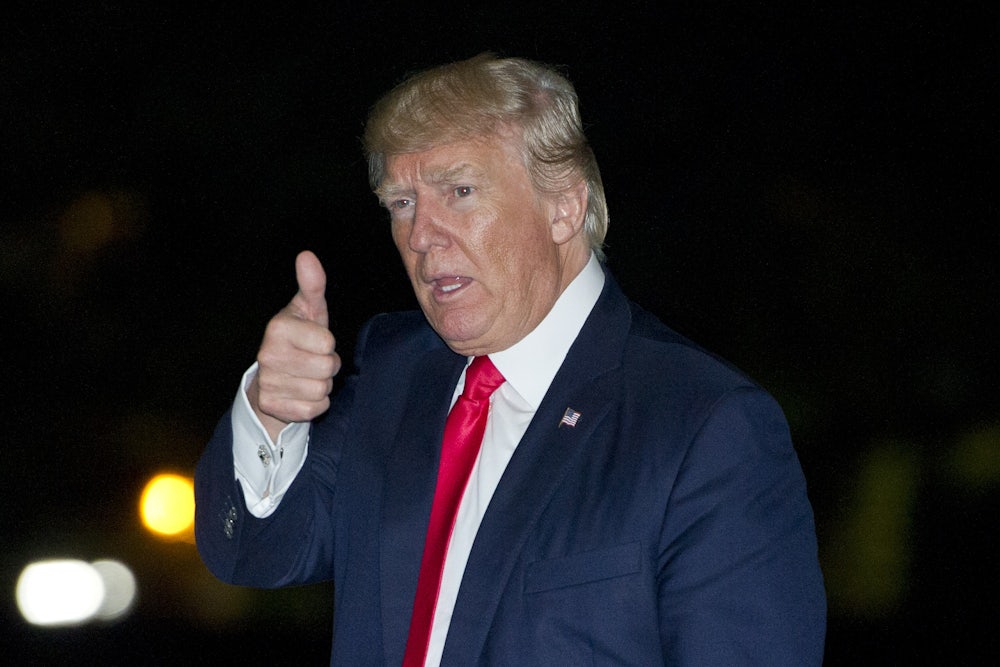President Donald Trump’s critics exulted over an interview he gave Thursday to Reuters, where he expressed surprise at how difficult his job is. “I loved my previous life. I had so many things going,” Trump said. “This is more work than in my previous life. I thought it would be easier.”
It was hardly the first time he’d expressed amazement about the challenges of his new position. In February, amid Republican infighting over Trumpcare, he said, “I have to tell you, it’s an unbelievably complex subject. Nobody knew that health care could be so complicated.” Earlier this month, after Chinese President Xi Jinping explained to him the history of China and Korea, Trump told The Wall Street Journal, “After listening for 10 minutes, I realized it’s not so easy.”
Delighted that Trump is struggling to achieve his goals, his critics are breathing a sight of relief at his thwarted presidency—or at least downgrading their alarm. Vox’s Matthew Yglesias wrote that “with the important exception of immigration, Trump’s first 100 days have been both more conventional and less consequential than he promised or than most Americans would likely have anticipated the morning after the election.” New York Times columnist, Gail Collins declared that Trump is running a “can’t do” presidency: “For a man who loves drama, Trump’s domestic role lately has been super undramatic.” Her colleague David Brooks concluded that Trump has “gotten smaller and more conventional. Many of his critics still react to him every single day at Outrage Level 11, but the Trump threat is at Level 3 or 4.”
These evaluations are short-sighted. It’s true that Trump’s legislative agenda is trapped in the quagmire of a divided Republican Congress, and that Trump is backtracking on many of his promises, especially his “America First” agenda. Speaking to the Journal on Thursday, he bizarrely tried to split the difference between the competing factions in his White House: “Hey, I’m a nationalist and a globalist. I’m both. And I’m the only one who makes the decision, believe me.”
But Trump’s failure to enact consequential domestic policies doesn’t mean he’s become a “conventional” president. The very ignorance of governance and policy that has made Trump’s first 100 days an exercise in futility is also radically reshaping the executive branch. His lasting legacy won’t be administrative inertia, but the corruption of the presidency itself.
Because being president is proving so hard, Trump has delegated many onerous duties for which he’s supposed to be responsible. For instance, he handed to the Pentagon the authority to set troop levels in Iraq and Syria, as well as decision-making power over launching raids and airstrikes in Somalia. Abdicating his responsibility as commander-in-chief, a task for which he has no aptitude, gives Trump more time to focus on what has been the prime concern of his presidency: self-enrichment.
Trump’s transformation of the presidency into a kleptocracy has unfolded at a dizzying and dismaying pace. “The Trump family and assorted cronies are using the highest office in the land to stuff their pockets,” Tim Egan wrote Friday in the Times. “The presidential sleaze involves everything from using public money to promote and enrich Trump properties to pay-to-play schemes that allow companies to buy influence at many levels.”
There are near-daily examples of such corruption: the use of his private resort, Mar-a-Lago, both as a presidential social club and insecure diplomatic compound (one that was promoted on a State Department website, no less, and which doubled its membership fee after Trump became president); the refusal to keep a log of who is visiting Mar-a-Lago; the nepotistic hiring of son-in-law Jared Kushner and daughter Ivanka Trump as White House employees; the hawking of Ivanka’s products by Trump aide Kellyanne Conway; the expansion of Trump’s brand (and Ivanka’s brand) into countries that he is also negotiating with; Kusher’s 400 million dollar partnership with the Anbang Insurance Group (described by Bloomberg as a firm whose “murky links to the Chinese power structure have raised national security concerns over its U.S. investments”); Trump’s failure to disentangle himself from his businesses, including the unannounced modification of the terms of Trump’s trust, allowing him to withdraw funds from his businesses without public disclosure; and the relentless financial secrecy, so that the public can’t even gauge conflicts of interest.
Worst of all, Trump’s corruption of the presidency isn’t confined to just his actions, but envelopes the entire Republican Party. Trump has a powerful ally in the GOP Congress, which has thwarted challenges to Trump’s emerging kleptocracy—by, for instance, blocking efforts to make him disclose his finances and any potential conflicts of interest.
Trump has shown that a president can shirk basic duties, remain ignorant of basic policy, pursue his personal financial interests, and still be defended by his party. Thanks to such complicity, Trump’s corruption has become enmesh in the political system, rather than contained to one man. By turning this into a partisan dispute, Republicans are making it difficult, if not impossible to challenge Trump’s corruption while he’s in office. But they’re also making it harder to clean up after he leaves office, for his successors will assume an office with loosened restraints, norms, and expectations. Put another way: Future presidents will have a new blueprint for what they can get away with in the White House.
